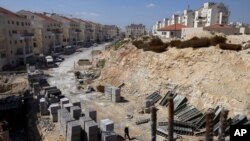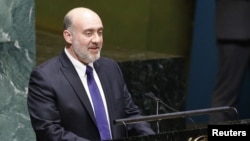Israel has revealed plans to build 3,000 new homes for its settlers in the occupied West Bank and east Jerusalem, following the Palestinian Authority's successful United Nations recognition bid.
Israeli officials, speaking to the media on condition of anonymity, said Prime Minister Benjamin Netanyahu's government had authorized the building plans, as well as preliminary zoning work in other areas of the West Bank.
The White House described the decision as "counterproductive," with spokesman Tommy Vieto saying these actions make it harder to resume direct negotiations or achieve a two-state solution.
The Israeli move has angered the Palestinians, who are celebrating a historic U.N. General Assembly vote upgrading the status of the Palestinian Authority to that of a non-member observer state.
Palestinians were especially cheered by the 138 U.N. members who voted in favor late Thursday. They said it added legitimacy to their claim for Palestinian statehood and added weight to their position in peace negotiations with Israel.
Nine countries, including Israel and the United States, opposed the resolution. Forty-one, including Britain and Germany, abstained, but the bid was endorsed by a large number of European Union members.
Israel denounced the decision. Netanyahu dismissed the vote as meaningless, while Israel's U.N. ambassador, Ron Prosor, said the new status will not advance peace.
Washington, which also opposed the measure, voiced similar concerns. The U.S. ambassador to the U.N., Susan Rice, said the U.N. decision hinders the prospects of reaching durable peace in Israel.
U.N. Secretary-General Ban Ki-moon said Thursday's vote underscores the urgency to return to negotiations, and called on both sides to return to the table.
The Vatican also welcomed the decision, calling for "an internationally guaranteed special statute" for Jerusalem, a comment bound to annoy Israel.
The new status does not establish a Palestinian state, but many Palestinians say they hope the move will bring a resumption of peace negotiations between the Palestinian Authority and Israel.
Israeli officials, speaking to the media on condition of anonymity, said Prime Minister Benjamin Netanyahu's government had authorized the building plans, as well as preliminary zoning work in other areas of the West Bank.
The White House described the decision as "counterproductive," with spokesman Tommy Vieto saying these actions make it harder to resume direct negotiations or achieve a two-state solution.
The Israeli move has angered the Palestinians, who are celebrating a historic U.N. General Assembly vote upgrading the status of the Palestinian Authority to that of a non-member observer state.
Palestinians were especially cheered by the 138 U.N. members who voted in favor late Thursday. They said it added legitimacy to their claim for Palestinian statehood and added weight to their position in peace negotiations with Israel.
Nine countries, including Israel and the United States, opposed the resolution. Forty-one, including Britain and Germany, abstained, but the bid was endorsed by a large number of European Union members.
Israel denounced the decision. Netanyahu dismissed the vote as meaningless, while Israel's U.N. ambassador, Ron Prosor, said the new status will not advance peace.
Washington, which also opposed the measure, voiced similar concerns. The U.S. ambassador to the U.N., Susan Rice, said the U.N. decision hinders the prospects of reaching durable peace in Israel.
U.N. Secretary-General Ban Ki-moon said Thursday's vote underscores the urgency to return to negotiations, and called on both sides to return to the table.
The Vatican also welcomed the decision, calling for "an internationally guaranteed special statute" for Jerusalem, a comment bound to annoy Israel.
The new status does not establish a Palestinian state, but many Palestinians say they hope the move will bring a resumption of peace negotiations between the Palestinian Authority and Israel.






